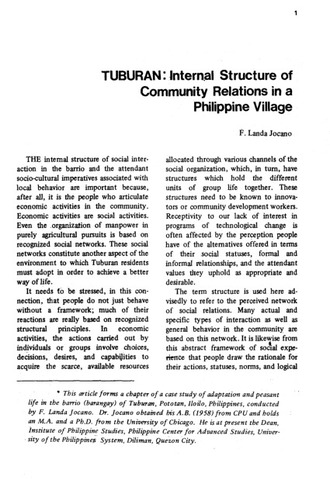Tuburan: Internal structure of community relations in a Philippine village
Abstract
This article forms a chapter of a case study of adaptation and peasant life in the barrio (barangay) of Tuburan, Pototan, Iloilo, Philippines, conducted by F. Landa Jocano. Dr. Jocano obtained his A.B. (1958) from CPU and holds an M.A. and a Ph.D. from the University of Chicago.
The internal structure of social interaction in the barrio and the attendant socio-cultural imperatives associated with local behavior are important because, after all, it is the people who articulate economic activities in the community. Economic activities are social activities. Even the organization of manpower in purely agricultural pursuits is based on recognized social networks. These social networks constitute another aspect of the environment to which Tuburan residents must adopt in order to achieve a better way of life.
It needs to be stressed, in this connection, that people do not just behave without a framework; much of their reactions are really based on recognized structural principles. In economic activities, the actions carried out by individuals or groups involve choices, decisions, desires, and capabilities to acquire the scarce, available resources allocated through various channels of the social organization, which, in turn, have structures which hold the different units of group life together. These structures need to be known to innovators or community development workers. Receptivity to our lack of interest in programs of technological change is often affected by the perception people have of the alternatives offered in terms of their social statuses, formal and informal relationships, and the attendant values they uphold as appropriate and desirable.
Description
Journal article
Suggested Citation
Jocano, F. Landa. (1978). Tuburan: Internal structure of community relations in a Philippine village.Type
ArticleISSN
0038-3600Subject(s)
Keywords
Collections
- Southeast Asia Journal [188]



